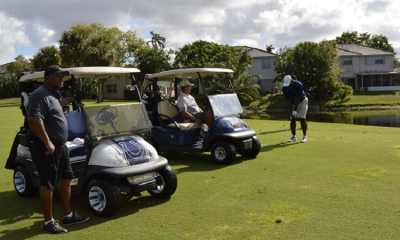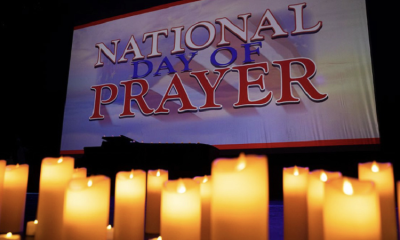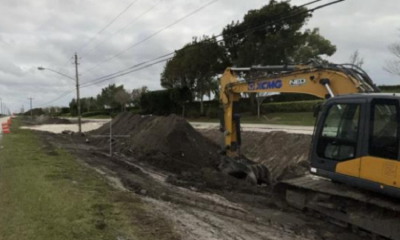U. S. News
Two Fargo deaths prompt questions about state oversight of memory care facilities

FARGO — In 2019, a man died after being punched at a Fargo memory care facility. About 19 months later, another resident at the same facility walked through a gate that was left unlocked before he was found dead two weeks later about a block away.
These two deaths that sparked police investigations are detailed in law enforcement reports obtained by The Forum, but the facility and North Dakota officials have balked at publicly discussing what changes have been implemented to prevent future deaths.
Documents obtained from the Fargo Police Department through a public records request shed light on how 80-year-old resident Robert McKinnon walked away from Maple View Memory Care in early October, and how he was found Oct. 13 in a vacant office building. The records also indicate McKinnon, who had dementia, was a known risk for eloping, with previous escapes from that facility and another Fargo center.
McKinnon’s death was the second connected to Maple View that police have investigated since 2019.
In the other fatal case, Michael Lyman punched 84-year-old Donard Thue Jr. on March 29, 2019, at the facility. Thue was not immediately taken to a hospital, according to police reports.
Thue, who woke up the next morning but was later found unresponsive, died April 3, 2019. Lyman died several months later at age 70.
The two cases raise questions about how the state oversees memory care facilities and how well officials enforce regulations meant to prevent unnatural deaths. One expert has asked why walkaways don’t automatically trigger investigations by state agencies and why facilities are not required to report elopements.
Memory care facilities are paid to keep residents safe and to prevent elopements, said Mark Kosieradzki, a Plymouth, Minn., attorney who specializes in cases involving nursing home neglect and abuse. Leaving a gate unlocked is an unacceptable mistake, he said.
“For people who are elopement risks, it’s just not a mistake you’re allowed to make,” he said, calling the mistake preventable. “The stakes are too high.”
The North Dakota Department of Health, which oversees basic care facilities like Maple View, would not disclose to The Forum the details of its discussions with Maple View surrounding McKinnon’s death, citing law that prevents it from disclosing patient information. Maple View leadership declined several requests for an interview with The Forum.
North Dakota Health Facilities Division Director Bridget Weidner said in an email that Maple View “implemented changes to address the circumstances.” She did not respond to an email asking what those changes were.
The health department has no documents related to McKinnon’s death, Weidner said. “The determination was made by the department that further investigation was not indicated,” she wrote.
Along with the state health department, the North Dakota Department of Human Services can also investigate incidents at basic care facilities that involve deaths, Weidner said. Human Services spokeswoman LuWanna Lawrence declined to say whether her department investigated the Maple View deaths, citing confidentiality laws.
Investigating an incident like McKinnon’s death could determine if negligence played a role in an elopement and could help prevent future deaths, Kosieradzki said.
“Why the Department of Health didn’t investigate this is very troubling to me,” Kosieradzki said. “Why didn’t the state investigate this to evaluate how a human being could be killed?”
What happened to Robert McKinnon?
McKinnon’s death was deemed accidental, resulting from environmental exposure and dehydration, said Fargo police spokeswoman Jessica Schindeldecker. Because his death was ruled accidental, the case was not sent to prosecutors for consideration of possible criminal charges, she said.
According to police reports:
McKinnon’s daughter told police he wanted to get out of the facility, possibly in an attempt to reach one of his old homes. Maple View leadership confirmed to police that McKinnon told staff he “wanted to go home.”
McKinnon had walked away from another memory care facility, where he previously lived. He was eventually evicted from that facility because he kept escaping.
He also escaped Maple View before going missing in October. He was later found and taken back to the facility.
On Oct. 1, a nursing assistant who had been working at Maple View for two months found McKinnon and another patient trying to leave the facility through the main door.
McKinnon said he wanted to go for a walk. And the nursing assistant allowed him to go alone into a fenced outdoor area around 4 p.m., then walked the other resident back to their room. The fenced area is normally locked.
About 15 minutes later, staff realized McKinnon was missing.
Staff assumed a lawn service company, unnamed in the police reports, didn’t lock the gate. McKinnon’s walker was found outside the fenced area.
The nursing assistant, whose name was redacted from the reports, said she didn’t know McKinnon shouldn’t go out by himself, nor did she know the gate was unlocked. She was suspended from work.
Law enforcement crews used drones and police dogs in an extensive search that was expanded to various parts of the city.
“We did the grid search, and all buildings were included in the search,” Fargo Police Lt. Chris Helmick said in an email to The Forum. “If the buildings were locked or closed, the searchers didn’t go in or contact owners. Hence, the reason we put out repeatedly for owners to check their properties.”
On Oct. 13, a Property Resource Group employee found a body while showing an office building at 3501 45th St. S. to potential buyers, according to the police reports. The employee said a south-end door of the building was left open in the first week of October so the sprinkler system could be checked, though it should have been locked after the check, the reports said.
The body was later identified as McKinnon’s. The reports did not give his time of death. Investigators do not believe he was living in the office building, Schindeldecker said.
The 2019 police investigation into Thue’s death was sent to the Cass County State’s Attorney’s Office, which declined to press criminal charges because Lyman, who was diagnosed with Alzheimer’s disease, “had no culpable state of mind.”
Lyman was supposed to be on 24/7 monitoring due to a switch in his medication, according to police reports.
Maple View employees who thought Lyman went to bed were sitting at a table down the hall leading to Lyman’s room, but they could not see down that hall, according to the reports.
Surveillance video shows the punch and then staff running to Thue’s side after staff heard a commotion in the hall.
Initially, Maple View declined to comment about the incident when contacted by The Forum for its first story on Thue, which was published in June 2019. After the story was published, Maple View issued a statement saying that staff followed all protocols during the altercation.
Maple View also announced that it changed its policy to require that any resident involved in a fight be sent to a medical facility.
Facilities don’t have to report altercations or elopements to the state health department, Weidner said. Maple View did not report Thue’s death to police or state officials.
Fargo police learned of Thue’s death through the Cass County Coroner’s Office, which had been alerted by a funeral home, according to police documents.
The state health department was not aware of Thue’s death until The Forum contacted it about a story a reporter was writing.
Maple View did inform the agency about McKinnon’s disappearance before he was found dead, Weidner said.
Regulated by the state
Basic care facilities, like Maple View, have some federal laws and regulations they must follow, but no federal agency oversees them.
State health department officials inspect such facilities in North Dakota, Weidner said. An out-of-compliance facility must write a corrective plan and enact changes.
Facilities can face enforcement actions for not following guidelines or correcting deficiencies. Penalties can include a ban or limitation on patient admissions and suspension or revocation of a facility’s license.
Weidner said neither a death nor injury at a basic care facility has resulted in a license revocation or suspension over the last decade. She said Maple View was not penalized in connection with the two deaths.
State inspectors typically visit basic care facilities every three years, though that depends on the availability of resources, Weidner said. A complaint can trigger an inspection, but the state doesn’t have to wait for a complaint to be filed, she said.
The department has received no complaints regarding Maple View over the last five years, she said.
Thue’s death was cited as a partial reason for a July 2019 inspection of Maple View, Weidner said. The facility was found to be in compliance at that point, according to a health department document.
McKinnon’s death did not trigger an inspection, Weidner said.
-

 Local News2 weeks ago
Local News2 weeks agoA Chef from Coral Springs Excels in Guy Fieri’s Grocery Games
-

 Local News5 days ago
Local News5 days agoAffordable sports physical examinations provided by Carbon Health Urgent Care of Coral Springs
-

 Local News2 weeks ago
Local News2 weeks agoSign up for the third annual golf classic hosted by the Coral Springs Chamber
-

 Local News2 weeks ago
Local News2 weeks agoMay 2 is National Day of Prayer; Residents of Coral Springs are invited
-

 Local News2 weeks ago
Local News2 weeks agoLocal High Schools submitted Cappie Theater Award nominations
-

 Local News1 week ago
Local News1 week agoConstruction on Loxahatchee Road in Parkland Expected to Take Longer, Stretching into 2027
-

 Local News1 week ago
Local News1 week agoSuperhero Swim Academy: prepare for summer safety
-

 Local News7 days ago
Local News7 days agoCoral Springs Charter softball wins Big-8 Championship





Leave a Reply